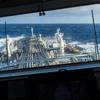Migrants Brave Deadly Dinghies
It is nighttime on a beach near the resort town of Bodrum and a group of migrants look out nervously at two ships on the horizon, wondering if they can slip past the Turkish coastguard and cross the Aegean Sea into a new life in Europe.
But their dinghies are poorly made and slow, and the coastguard has stepped up patrols in the area, where the body of toddler Aylan Kurdi washed up, sparking international outrage.
While Europe has only woken up to the size of the refugee crisis this summer, Turkey has been the front lines for more than four years. It shares a 900-km (550 mile) border with Syria and has welcomed those fleeing the civil war, now in its fifth year.
It now hosts the world's largest refugee population, at 2.2 million, and has spent $7.6 billion on providing them food, shelter and care, according to Deputy Prime Minister Numan Kurtulmus.
Many refugees attempt to use Turkey as a springboard into wealthier Europe. A record 300,000 or more Syrians and other migrants have arrived in Greece, mostly setting off from Turkey's Aegean coast, according to the International Organisation for Migration.
"Tonight, Al Yunan!", one young migrant says, using the Arabic name for Greece.
They wait until around 4 a.m., when the sea is calmest just before dawn, and then float the dinghies - cheap, dangerous boats - strap on their life vests and hit the sea.
PERILS OF DAYLIGHT CROSSING
At its closest, Bodrum is just 4 km from the Greek island of Kos, but the coastguard is also nearby. Paddles and deflated boats float on the open water, signs of earlier attempts to cross that were foiled by the Turkish patrols.
The coastguard has rescued more than 53,000 migrants while 274 have died in Turkish waters, Kurtulmus has said, without specifying a time frame.
The "captains" of the migrant dinghies are often immigrants themselves, with no experience on the sea.
As one of the boats starts to take water, a migrant dumps his only belonging into the sea, a bag carrying his phone charger, a few clothes and some medicine.
Only one of dinghies manages to evade the coastguard tonight. The others are stopped and brought back to land, where they will be detained and questioned. If they are Syrian, they are sent to refugee camps. Migrants from other countries are deported.
Other migrants remain on the beach, waiting for sunrise, when the patrols end their shifts and turn back to port. But a morning crossing brings its own perils, such as tourists in yachts and watchful locals on the beach.
"I called the coastguard the other day and reported a boat. It doesn't make me a bad person because I was trying to help," one 55-year-old Bodrum local, himself a yacht captain, told Reuters.
"A vessel was passing and they were just paddling right toward it. They were going to get killed otherwise."
(Writing by Ece Toksabay and David Dolan; editing by Ralph Boulton)













